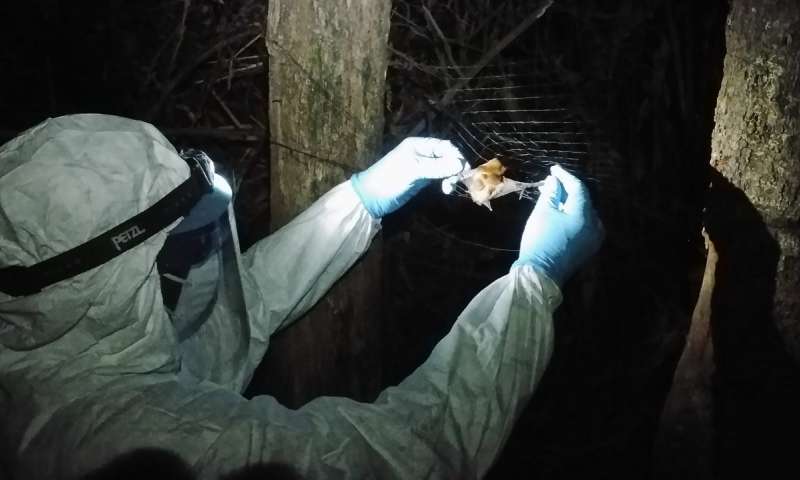
PREDICT’s Ebola Host Project team processes samples collected safely and humanely from bats in the field. EHP is active in Sierra Leone, Guinea, and Liberia where teams are sampling wildlife and domestic animals to learn more about potential host species for ebolaviruses. Credit: Jaber Belkhiria/UC Davis
An international team of researchers has found a new species of the Ebola virus in a host before it has been detected in an infected human or animal.
Scientists from the University of California Davis One Health Institute, Columbia University’s Center for Infection and Immunity and the University of Makeni and Metabiota, with help from the Sierra Leone government, has discovered the Bombali virus in bats in Sierra Leone.
The work is part of the PREDICT Ebola Host Project, a project that aims to find viruses prior to spilling over into humans that is funded by the United States Agency for International Development.
While the Bombali virus could potentially infect humans, it is currently unknown whether the virus has already caused human infections or is harmful to humans.
“Identifying new viruses like Bombali ebolavirus in wildlife and testing their capacity for human infection can enhance our understanding of the pre-emergent viral diversity circulating in animals,” co-lead author Simon Anthony, a virologist and assistant professor of epidemiology at Columbia University Mailman School of Public Health, said in a statement. “We want to discover viruses that have the genetic prerequisites for human infection and then prioritize them for further study and intervention.”
Prior to the discovery of the new virus, researchers had identified five ebolavirus species, including the Zaire ebolavirus that killed thousands of people between 2013 and 2016.
With the discovery of the Bombali virus, there is now more evidence of the belief that bats are the likely Ebola hosts.
“If you want to prevent Ebola outbreaks, it’s important to know which species are hosts and can shed the virus,” co-lead author Tracey Goldstein, an associate director of the One Health Institute at the UC Davis School of Veterinary Medicine, said in a statement. “Then we can help target changes in behavior so we can protect people, which is the overarching goal of our work.”
The researchers sampled more than 6,000 animals in Sierra Leone and performed tests aimed at discovering both known and unknown ebolaviruses. They identified the Bombali virus in five individual bats belonging to two different species of insectivorous bats that were found roosting inside of homes.
Infected bats are not known to show signs of illness. However, they can shed viruses through their saliva and feces, exposing other animals and people if they touch live or dead bats, ingest food or water where bats may have fed or come into contact with the urine or feces of infected bats.
The study was published in Nature Microbiology.




